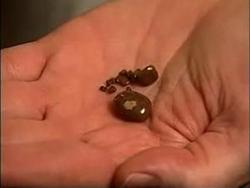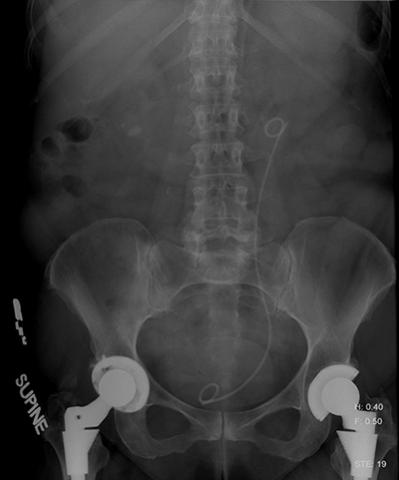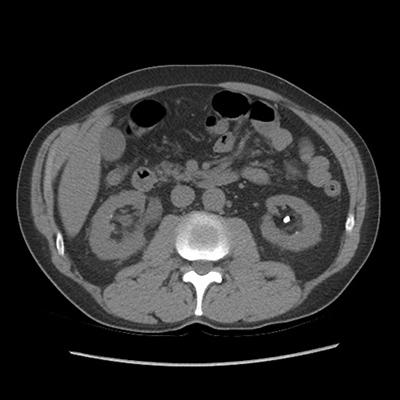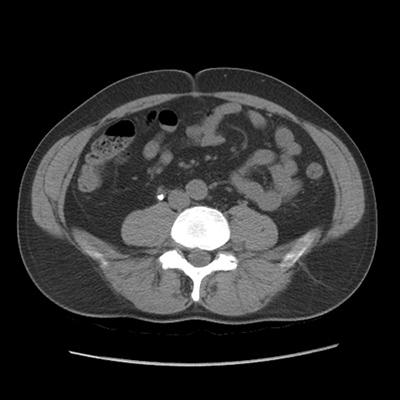About Kidney Stones
Approximately 13% of men and 7% of women in the United States will have a kidney stone sometime in their lifetime. The prevalence of kidney stones is increasing significantly in the United States.
At Michigan Medicine, our Endourology, Kidney Stone and Lithotriptor Program has a history of outstanding clinical care, innovation and research.

As a comprehensive stone program we provide patient services across the entire spectrum of care – working closely with endocrinologists, nephrologists and radiologists to offer the best care possible to you. Our urologists are experts in diagnostic evaluation, surgical therapies, metabolic studies and nonsurgical care, and treat approximately 1000 stone patients a year. We intend to evaluate you and then manage your problem quickly, efficiently and effectively. We aim to minimize the duration of the period from symptom onset to resolution of the problem, and to resolve the problem with minimally-invasive techniques that are individualized for your specific situation.
Kidney Stone Signs and Symptoms
Kidney stones are conglomerations of crystals that form when concentrations of minerals in the urine become very high. As their name implies, stones almost always start in the kidneys. They may cause problems there, or may not be noticed until they move into the ureter (the tube that connects the kidney to the urinary bladder). Once stones enter into the ureter the can obstruct the drainage of urine which generally causes symptoms such as pain in the upper back (i.e., the flank) or lower abdomen, nausea, vomiting, and blood in the urine. Many stones will pass down the ureter, into the bladder and then be voided with urine. Occasionally stones can remain lodged in the ureter or within the bladder.
Kidney Stone Treatment Options
We work with patients in every stage of their condition, creating a personalized plan whether surgery is needed or not. We also try to identify factors that may be causing the stones, so we can keep current stones from getting larger and reduce the risk of developing future stones.
When suspected of having a kidney stone, we take a history, perform a physical, exam, and obtain radiological imaging. Studies may include a plain x-ray of the abdomen, a renal ultrasound, or a CT scan. They help us determine the location of the stone, its size, the degree to which the stone may be causing an obstruction to urine flow, and what types of therapy would be appropriate for management.
Kidney, ureter and bladder (KUB) plain abdominal radiograph

CT Scan showing left kidney stone
CT scan showing right ureteral stone
Conservative Management
In cases when the stone has moved into the ureter, especially if the stone is small (less than 0.5 centimeters), we often recommend conservative management. We do this because many smaller stones will pass on their own, allowing patients to avoid surgery. Conservative management includes pain control (usually with acetaminophen and a non-steroidal anti-inflammatory drug like ibuprofen), hydration (6 to 8 glasses of water a day), and medical expulsive therapy using an alpha blocker (e.g., tamsulosin). Many stones will pass with this management, without requiring a surgical procedure.
Minimally Invasive Surgical Treatments for Kidney Stones
Factors that influence stone passage include the stone’s size and location. The larger a stone is, the less likely that it will pass without surgery. Surgical treatment is usually recommended for stones 0.5 centimeters in size and larger, as well as for patients who fail conservative management. The procedures used today to remove stones are minimally invasive and highly effective. The most common techniques include shock wave lithotripsy, ureteroscopy with laser lithotripsy, and percutaneous nephrolithotomy. Our endourology team performs over a thousand of these procedures every year, using the latest technology.
Shockwave lithotripsy (SWL) is the least invasive procedure and is done on an outpatient basis. Using X-ray or ultrasound imaging to identify the stone, shockwaves are applied from outside the body to break the stone into smaller fragments that are then passed in the urine. SWL is an option for kidney stones up to 2 centimeters in size that are not located in the lower part of kidney, depending on other patient factors.
Ureteroscopy with laser lithotripsy (URS) may be used for stones up to 2 centimeters in size located anywhere in the ureter or kidney. This procedure involves passing a small diameter fiberoptic ureteroscope through the bladder and into the ureter, allowing the surgeon to see the stone. A laser is then used to break the stone into smaller pieces that can be removed or passed in the urine. URS is especially useful for ureteral stones, those located in the lower part of the kidney, and those that are resistant to SWL.
Percutaneous nephrolithotomy (PCNL) is the best option for larger kidney stones (i.e., those greater than 2 centimeters in size) or when there are other complicating anatomic factors. PCNL involves making a half-inch incision in the back through which the surgeon extracts stones using a nephroscope. Patients typically require a one-night hospital stay, followed by a brief recovery period at home.
Medical Treatment to Prevent Stones
Factors which increase the risk of stones include:
- Gender: Men are more likely than women to form kidney stones, although the rate is increasing faster in women and soon men and women might have equal risk of kidney stone formation
- Family history: If you have family members with stones, you have a higher risk of developing kidney stones
- Diet: Diets high in fat, processed sugar, and salt place people at risk of forming kidney stones
- Weight: Obesity is strongly associated with kidney stones
- Personal history: If you formed your first stone when you were young, or if you have already formed more than one stone, you are at greater risk of having more stones
The cornerstone of medical treatment to prevent stones is increasing fluid intake. It is recommended that you drink enough fluid to produce 2 liters of urine each day. That is the equivalent to the amount of fluid in a 2 liter soda bottle. It’s important that you spread this out over the entire day rather than drinking the whole amount at one time. It is recommended that you include a glass of water just before bedtime. The goal is to make sure your urine has the appearance of water. If the urine is yellow then you probably aren’t drinking enough.
If you are thought to be at greater risk of stone formation, then we will offer to work with you to create a personalized program to prevent stone formation in the future. In addition to a stone analysis (it’s important that you catch the stone and bring it to your doctor!), blood studies and a 24-hour urine collection can help direct to your personalized medical therapy. There are many metabolic causes of stones, in various combinations, and we will determine your specific metabolic problem and work with you to address it with diet or medications. If you have frequent stone recurrences, multiple medical problems, or additional urologic problems such as neurogenic bladder, chronic infection or obstruction, then our comprehensive program is particularly well suited for you.
Cutting Edge Research
We actively participate in research for developing newer methods and techniques for treating kidney stones. We also study therapy trends, quality of care and effectiveness of treatments to improve the understanding of kidney stones and the level of care for all stone patients. As a patient you are eligible to participate in active clinical trials that could be a benefit to your situation.
Rapid Access Kidney Stone Clinic
The Rapid Access Kidney Stone Clinic at the Livonia Center for Specialty Care offers kidney stone patients access to x-rays, CT scans and the option for same-day diagnosis and treatment, all under one roof. All of this is complemented by the improved access to doctors and convenient parking available at the Livonia Center for Specialty Care.
Make an Appointment
If you are a patient looking to receive kind and compassionate care at the leading urologic practice in Michigan, call 734–936–7030 to make an appointment. If you are a Health Provider looking to refer a patient, please visit the please visit the For Health Providers page.


